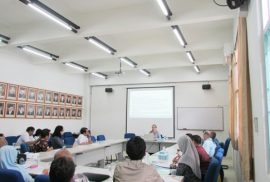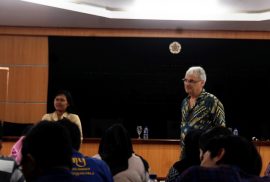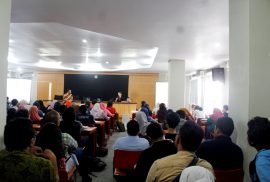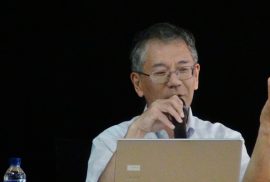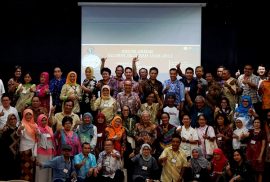“Now answer me, is there any category beside literature sociology?” ask Bambang Purwanto to the students of the doctoral program in the Department of History UGM. They explained their plan for the dissertation proposal in front of him. Bambang views their research proposal still has some weakness and is less contextual. This was delivered at the public lecture about dissertation writing themed “From Research Question Proposal to Thesis Writing” on Wednesday (19/04) in Meeting Room I, Poerbatjaraka Building, FIB UGM.
2017
“Sekarang jawab saya, apakah ada kategori baru selain sosiologi sastra?” sanggah Prof. Bambang Purwanto kepada mahasiswa baru S-3 Sastra FIB UGM, yang menjabarkan rancangan penelitian disertasinya. Bambang Purwanto menilai rancangan penelitian yang diajukan mempunyai beberapa kelemahan dan tidak kontekstual. Hal itu ia sampaikan dalam kuliah umum tentang penulisan disertasi yang mengusung tema “From Research Question Proposal to Thesis Writing” pada Rabu (19/04) di Ruang Sidang I, Gedung Purbatjaraka, FIB UGM.
One of the milestones of national revival came from STOVIA. The Javanese medical school became important in the Indonesian nationalist movement. The reason was based on the emergence of Boedi Utomo on May 20, 1908, whose initiators were mostly STOVIA students. This was stated by Prof. Hans Pols from the University of Sidney in a public lecture themed “The Indonesians Medical Profession in the Dutch East Indies: Medicine, Nationalism and Decolonization” by the Department of History UGM on Monday (10/4) at FIB UGM. According to Hans, the medical student at STOVIA at the same time not only learned about health but also about nationalism and the importance of independence. “At that point, then the medical profession had a vital role at that time,” Hans said.
Salah satu tonggak kebangkitan nasional berasal dari STOVIA. Sekolah dokter Jawa itu menjadi penting dalam pergerakan nasional Indonesia. Alasan itu didasari atas munculnya Boedi Utomo pada 20 Mei 1908, yang para pengagasnya, kebanyakan berasal dari siswa STOVIA. Hal itu diungkapkan oleh Prof. Hans Pols dari University Of Sidney dalam kuliah umum yang digagas oleh Departemen Sejarah UGM pada Senin (10/4), bertempat di Fakultas Ilmu Budaya UGM. Kuliah umum itu mengangkat tema “The Indonesians Medical Profession in the Dutch East Indies: Medicine, Nationalism and Decolonization”. Menurut Hans, mahasiswa Kedokteran STOVIA, pada saat yang sama tidak hanya belajar tentang kesehatan, namun juga mulai belajar tentang nasionalisme dan pentingnya kemerdekaan. “Pada titik itulah, kemudian profesi dokter mempunyai peran vital masa itu” ungkap Hans.
On Monday (3/4) Marjolein van Pagee, the founder of Histori Bersama, had the opportunity to attend a discussion held by the UGM History Department, in the Multimedia room, second floor, Margono building, FIB UGM. Marjolein tells about the Joint History and the historical relationship between the Netherlands and Indonesia. “Indonesia and the Netherlands, admit it or not, they are connected to each other because of colonization, and it’s not a short time,” said Marjolein.
According to Marjolein, a shared understanding of the history of the two countries is very much needed. It is useful for healing the wounds of the two countries’ past. Furthermore, the woman who studied colonial history at Leiden University explained the reason for the presence of the Joint History. The foundation exists as a bridge connecting the two countries. In the end, Marjoleine hopes that what she does can help to avoid the misunderstanding of the history of the two countries that is still ongoing. For him, true reconciliation comes after understanding.
Layar proyektor memutar sebuah film dokumenter. Terlihat dalam film itu, seorang lelaki tua sedang diwawancara terkait pengalaman perang. “Pokoknya masa itu saya tidak tenang, tidak aman” katanya. Ia adalah seorang mantan veteran –yang dulunya seorang petani- yang turut berjuang dalam perang revolusi 1945-1949. Veteran itu mengatakan bahwa ia bangga dengan apa yang sudah dilakukan. Ia mengungkapkan perjuangannya dalam mempertahankan kemerdekaan. Kisahnya adalah kisah perjuangan. Tidak berselang lama sebuah film dokumenter lain diputar. Kali ini yang ditampilkan adalah seorang lelaki warga negara Belanda. Usianya hampir sama tua dengan lelaki pertama. Tetapi yang jelas, ia juga adalah veteran perang. Dulu ia tergabung dalam pasukan yang membonceng NICA untuk melakukan agresi militer. Ia menangpak para pejuang kemerdekaan. Namun, dalam penuturannya ia merasa bersalah atas tindakannya. Dalam pandangannya, apa yang dilakukan Belanda terutama pada 1945-1949 tidak bisa dibenarkan. Dua film itu menunjukkan ada dua perspektif berbeda dalam membaca sejarah ketika masa revolusi.
Demographic issues have emerged as a common topic nowadays. According to LIPI’s report, in the years 2020 until 2030, Indonesia will get a demographic bonus. At that time, the population in Indonesia will increase. The number of productive age population (17-64 years) will be more than the non-productive age. The comparison touches the number of 70 to 30 percent. This is in contrast to the situation in Japan. The population curve in the land of the ‘rising sun’ forms an inverted triangle. Japan suffers from the burden of a large aging population.
Isu penduduk cukup mendapat perhatian akhir-akhir ini. Di Indonesia, menurut laporan LIPI, pada 2020-2030 nanti, Indonesia akan mendapat bonus demografi. Berdasarkan perhitungan, pada rentang tahun itu proporsi jumlah penduduk Indonesia mengalami tingkatan yang baik jika dilihat dari segi ekonomi. Jumlah penduduk usia produktif (17-64 tahun) akan lebih banyak dari usia non-produktif. Perbandingannya menyentuh angka 70 banding 30 persen. Hal ini berbanding terbalik dengan keadaan yang ada di Jepang. Kurva penduduk di negeri ‘matahari terbit’ itu membentuk segitiga terbalik. Jepang mengalami beban penduduk usia senja yang banyak.
Saturday morning (18/3) the atmosphere in the courtyard of the Poerbatjaraka building, Faculty of Cultural Sciences, UGM was suddenly crowded. Several people were seen shaking hands and laughing. Not a few also hug. That day the History Department held a Grand Reunion. The event was held for two days, March 18-19 at the Faculty of Cultural Sciences UGM. Participants consisted of history alumni from various generations and strata. The organizing committee -which consists of several initiators from the alumni circle- carries the theme “The Past Is Always Actual”.
Sabtu pagi (18/3) suasana pelataran gedung Purbatjaraka Fakultas llmu Budaya UGM mendadak ramai. Beberapa orang terlihat bersalaman lalu tertawa. Tidak sedikit pula yang berpelukan. Hari itu Departemen Sejarah UGM menggelar Reuni Akbar. Acara itu dihelat selama dua hari yakni 18-19 Maret bertempat di Fakultas Ilmu Budaya UGM. Peserta terdiri dari alumni sejarah berbagai angkatan dan strata. Panitia penyelenggara -yang terdiri dari beberapa inisiator dari kalangan alumni- mengusung tema “Masa Lalu Selalu Aktual”.

